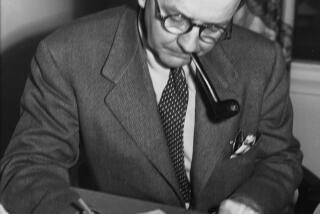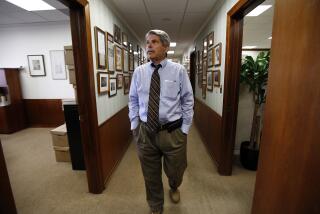A Bagel in Exile
- Share via
Next to New York or San Francisco, San Diego isn’t a famous writers’ destination. Still, the ghosts of essential American poets are gathered there, with all the amenities, in a luxurious hotel for literary ghosts.
For me, this came to light when I called up David Ignatow, the New York poet, for one of our periodic conversations and he declared: “One day soon, I’m coming to California!”
I asked why, and from Long Island, he explained that his papers were at the Archive for New Poetry, at the University of California at San Diego. “Your papers are in California?” I asked, shocked by this incongruity--after all, this is a poet who once imagined himself as a bagel rolling through Manhattan streets. At 81, he’s one of the country’s most distinctive poets, praised by William Carlos Williams as the founder of a model urban idiom.
“Me and Reznikoff, we’re both there,” he said, as though he couldn’t wait to join his old friend. Charles Reznikoff, the great New York poet who died in 1976, is one of more than a dozen beacons of 20th-Century poetry whose papers the archive holds, including those of James Schuyler, Paul Blackburn and George Oppen. Other homes for the permanently retired avant garde exist--the State University of New York at Buffalo and the Beinicke Library at Yale are two. But San Diego’s is unusually comprehensive, rooted in a 30-year effort to gather the small literary reviews that have proven over generations to be the nation’s laboratory for written culture.
Ignatow packed up his literary belongings, letters and manuscripts, including 200 unpublished poems, and shipped them West in 1985. It’s a parting the poets I’ve talked to compare to sending children away to school. But their archival future is well-tended with acid-free folders and climate-control on the main floor of UCSD University Library, part of the Mandeville Special Collections. Ignatow praised it as highly organized, but is visiting to make sure everything’s in order. “I may not have a chance again.”
Ignatow, Reznikoff and Oppen were among the so-called “objectivists,” a term for the striving, mostly by the sons of Jewish immigrants, to come to artistic terms with hard-edged American experience. But the collection reaches into many corners of American poetry, from the Black Mountain School to the Dada experiments of Jerome Rothenberg, who teaches at UCSD.
Ignatow was drawn to the archive through a friendship with Roy Harvey Pearce, a UCSD professor of literature, since retired, who founded the archive. It is run by both librarians and poets. “The goal is to have the whole progress of a poem, from its first drafts to its published form, to audiotapes of the poets reading their own work,” said Michael Davidson, a UCSD poet-professor who has run the archive. He said two scholars from Spain are doing research there now, of many international visitors.
Ignatow spoke of his coming trip with the ghostly, exilic joy of a man embarking on a visit to himself. In fact, the redemptive radiance of death as part of life is basic to the Ignatow aesthetic. In the middle of our talk, I asked if, while preparing to be a dead poet, he might not want to take seize upon his role as a live one and stop in Los Angeles to read. And so he will be at Beyond Baroque in Venice this Friday at 8:30 p.m., after his visit to UCSD, where a reading will be taped and carefully put away.
More to Read
Sign up for our Book Club newsletter
Get the latest news, events and more from the Los Angeles Times Book Club, and help us get L.A. reading and talking.
You may occasionally receive promotional content from the Los Angeles Times.







